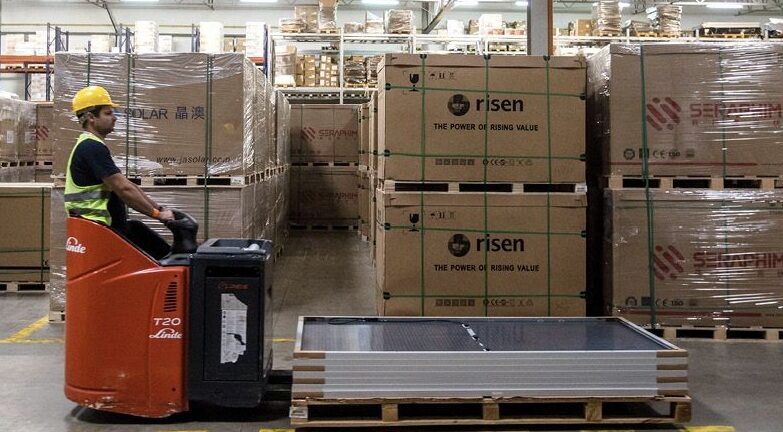The German Federal Ministry of Economics and the German Federal Ministry of Transport selected 62 large-scale hydrogen projects to receive €8 billion in government funding as part of a joint European hydrogen project, which is known as Hydrogen IPCEI – Important Projects of Common European Interest. “We want to become the world's number one in hydrogen technologies… A key area for this is the steel industry as well as the chemical industry,” commented Economy Minister Peter Altmaier. Around €4.4 billion come from his Federal Ministry; up to €1.4 billion from the Federal Ministry of Transport. The federal states will provide the remaining funding. Among the 62 projects, some will focus on electrolysis capacity to produce green hydrogen. According to the estimates, they should lead to 2 GW of new electrolysis capacity, corresponding to 40% of the 2030 target set in the National Hydrogen Strategy presented last year (5 GW). “Green hydrogen and fuel cells — across all modes of transport — are a super complement to battery-only vehicles. The fact is: we urgently need and want to push the transition to climate-friendly mobility,” Transport Minister Andreas Scheuer said on Friday.
The International Renewable Energy Agency (IRENA) called on governments to increase public support for green hydrogen, as incentives should be the key element for the ramp-up of the supply chain. “Current government incentives and policies targeted at electrolyzers and infrastructure remain limited. But solutions can also be drawn from the experience governments have gained in supporting renewable energy in power and heating, as well as from policies in the industry sector,” the organization wrote in its new report, “Green Hydrogen Supply: A Guide to Policy Making.”
Eleven projects have been selected in the framework of H2 Hub Airport, a call for expressions of interest to contribute to the hydrogen airport ecosystem in France. Groupe ADP, Airbus, Air France-KLM and the Île-de-France Region, with the support from Choose Paris Region, launched the call in February. The initiative paves the way for the Airbus hydrogen aircraft (planned for 2035), while promoting the short-term development of hydrogen uses on the ground. According to a note released on Thursday, some projects are in the R&D phase, while others, more advanced, could be commissioned in the medium term. “We are pleased by the success of this call for expressions of interest, which will contribute in making Paris Region a territory for the deployment of hydrogen,” commented Valérie Pécresse, chairwoman of Paris Île-de-France Region.
French energy company Total acquired a 20% stake in Hysetco, a French company developing hydrogen mobility in cities. The other shareholders are Société du Taxi Electrique Parisien (STEP), Air Liquide, Toyota and Kouros. “Hysetco currently owns around 700 taxis in Paris, with still a majority of diesel vehicles that will transition gradually to become exclusively comprised of hydrogen vehicles by 2024. The hydrogen taxis are fueled by a dedicated network of hydrogen stations operated by Hysetco. This network is expected to expand in the coming years to support the growth of a hydrogen vehicle fleet,” reads a note released on Wednesday.
Over the last week, Energy Observer and the City of Paris organized an event to raise awareness about the energy transition. Taking place through May 30 on the Champ-de-Mars, the Energy Observer exhibition village brings together concrete applications of hydrogen mobility and systems. Among the industry players taking part are EODev, Toyota, Delanchy, Air Liquide, Chéreau, Alstom, Airbus, La Poste, Engie and Pragma Industries. As part of the event, the Eiffel Tower was illuminated using an electro-hydrogen generator developed by EODev (Energy Observer Developments) with certified renewable hydrogen, according to Energy Observer.
Peugeot, the French carmaker owned by Stellantis Group, announced that its new e-Expert Hydrogen will first be offered to its commercial customers in France and Germany from the end of 2021. “It will be produced in France, in Valenciennes, and then transformed in the Stellantis competence centre dedicated to hydrogen technology in Germany, in Rüsselsheim,” reads a note released on Thursday. The vehicle includes a new “mid-power plug-in hydrogen fuel cell electric” system, made up of a fuel cell and a 10.5 kWh high-voltage lithium-ion rechargeable battery. According to Peugeot, the vehicle can be filled up with hydrogen in three minutes for a range of over 400 km.
Italian gas transmission system operator Snam launched the Hydrogen Innovation Center, calling it “Italy's first national center of excellence for hydrogen technologies.” The Milan-based company aims to bring together industrial partners and university research centers to accelerate the development of the sector, extending the company’s partnership network abroad within the next two years. The first site of the Hydrogen Innovation Center will be opened in Modena, under a collaboration agreement between Snam and the University of Modena and Reggio Emilia. “Other hubs in the country will follow, including one with the Polytechnic University of Milan; by the end of 2021, an overseas hub will also be established, in collaboration with a prestigious university in the United States,” the company said Wednesday.
Russian Deputy Prime Minister Alexander Novak said that the Russian government had proposed to Saudi Arabia to team up on hydrogen production during an online meeting of Russia and Saudi Arabia's intergovernmental commission. “We have a proposal to create a working group on hydrogen energy,” Novak said, as reported by Reuters and Al Arabiya.
This content is protected by copyright and may not be reused. If you want to cooperate with us and would like to reuse some of our content, please contact: editors@pv-magazine.com.



1 comment
By submitting this form you agree to pv magazine using your data for the purposes of publishing your comment.
Your personal data will only be disclosed or otherwise transmitted to third parties for the purposes of spam filtering or if this is necessary for technical maintenance of the website. Any other transfer to third parties will not take place unless this is justified on the basis of applicable data protection regulations or if pv magazine is legally obliged to do so.
You may revoke this consent at any time with effect for the future, in which case your personal data will be deleted immediately. Otherwise, your data will be deleted if pv magazine has processed your request or the purpose of data storage is fulfilled.
Further information on data privacy can be found in our Data Protection Policy.